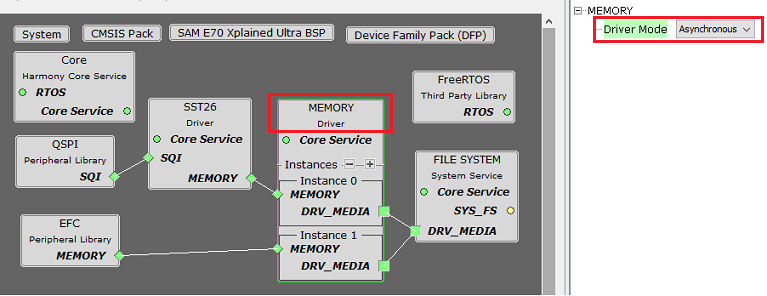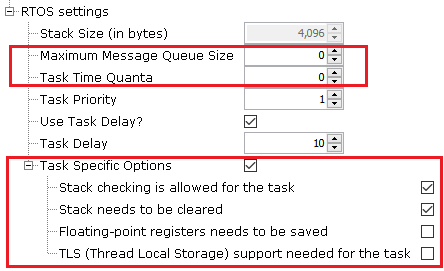1.1.3.3 Configuring The Library
Memory Driver Library should be configured via MHC. The following figures show the MHC configuration window for Memory Driver and brief description.
Common User Configuration for all Instances

- Driver Mode:
- Allows User to select the mode of driver(Asynchronous or Synchronous). This setting is common for all the instances.
Instance Specific User Configurations
Asynchronous Mode with RTOS and File System

Synchronous Mode with RTOS and Without File System

Number Of Clients:
- Specifies number of clients to access the specific instance of the driver
File System Enabled For Memory Driver:
- Specifies if File system service is connected to the instance of Memory Driver
Buffer Queue Size:
- Specifies maximum number of requests to be buffered in queue
- This Configuration is displayed only in Asynchronous mode
Memory Device Type:
- Specifies the type of the memory device to be used when the File system is connected to this instance
Memory Device Used:
- Specifies the Media device connected
Memory Device Status Polling Rate Microseconds:
Specifies the interval to poll for the transfer status
Option is displayed only in Synchronous mode and when Memory device used does not support interrupt mode
RTOS Settings:
This configuration is displayed only in asynchronous mode
Stack Size (in bytes):
- Specifies the number of bytes to be allocated on the stack for the Memory driver task of the instance
Task Priority:
- Specifies priority for the Memory driver task thread. The value can vary based on RTOS used
Use Task Delay?
When enabled the Memory driver task will be scheduled out voluntarily after every run based on the delay configured.
Task Delay:
Specifies the duration the task has to go to sleep after every run.
Should be configured carefully based on the application need and number of task running along in the system
RTOS Settings For MicriumOS-III RTOS
Below additional options are visible in drivers instance RTOS settings when the MicriumOS-III is added into project graph

Maximum Message Queue Size:
This argument specifies the maximum number of messages that the task can receive through internal message queue.
- A MicriumOS-III task contains an optional internal message queue (if OS_CFG_TASK_Q_EN is set to DEF_ENABLED in os_cfg.h).
The user may specify that the task is unable to receive messages by setting this argument to 0
Task Time Quanta:
The amount of time (in clock ticks) for the time quanta when Round Robin is enabled.
If you specify 0, then the default time quanta will be used which is the tick rate divided by 10.
Task Specific Options:
Contains task-specific options. Each option consists of one bit. The option is selected when the bit is set.
The current version of MicriumOS-III supports the following options:
Stack checking is allowed for the task:
- Specifies whether stack checking is allowed for the task
Stack needs to be cleared:
- Specifies whether the stack needs to be cleared
Floating-point registers needs to be saved:
Specifies whether floating-point registers are saved.
This option is only valid if the processor has floating-point hardware and the processor-specific code saves the floating-point registers
TLS (Thread Local Storage) support needed for the task:
If the caller doesn�t want or need TLS (Thread Local Storage) support for the task being created.
If you do not include this option, TLS will be supported by default. TLS support was added in V3.03.00
